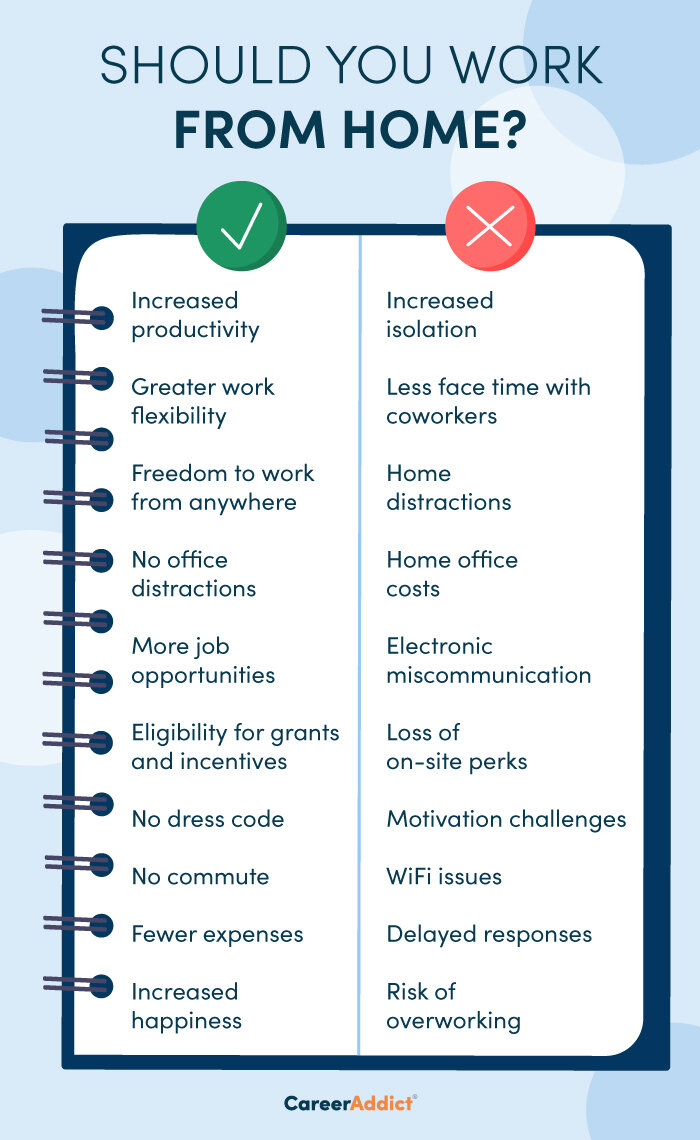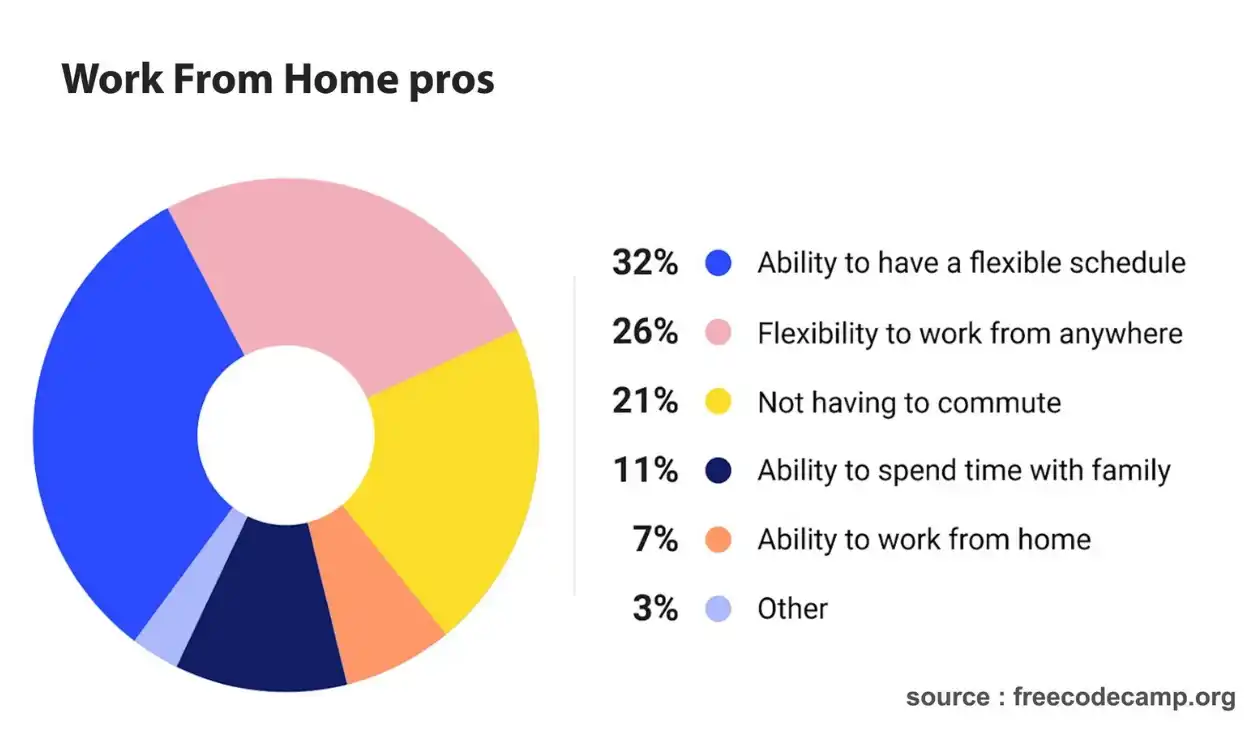Working from home offers flexibility and work-life balance, but it can lead to isolation and distractions. Many people appreciate the convenience and freedom that comes with remote work, allowing them to save time and money on commuting.
However, it can also blur the lines between work and personal life, making it challenging to disconnect. While working from home can increase productivity and reduce stress, it may also lead to feelings of loneliness and limited career growth opportunities.
Despite the pros, it’s important to consider the potential cons and find a balance that works best for individual needs and preferences.
The Rise Of Remote Work
The rise of remote work has brought both advantages and disadvantages. Working from home offers flexibility and eliminates commuting, but it can also lead to isolation and blurred work-life boundaries. Productivity and work-life balance can improve, but communication and collaboration may suffer.
Origins And Growth
Remote work has a history of gradual evolution, dating back to the early 1970s.
Initially, telecommuting emerged as a way to reduce traffic congestion and improve work-life balance.
Advancements in technology further fueled the growth of remote work, making it more accessible.
Pandemic Influence
The COVID-19 pandemic acted as a catalyst for the widespread adoption of remote work.
Organizations swiftly shifted to remote setups to ensure business continuity and employee safety.
Remote work became a necessity rather than a choice, reshaping the future of work dynamics.
Benefits Of Working From Home
Working from home has become more popular than ever before. Thanks to the advancements in technology and the internet, more and more businesses are allowing their employees to work from home. There are many benefits of working from home, including:
Flexibility In Scheduling
One of the biggest advantages of working from home is the flexibility in scheduling. When you work from home, you have the freedom to set your own work hours. This means that you can work when it’s most convenient for you, whether that’s early in the morning or late at night. This can be especially helpful for those who have children or other responsibilities that require them to be available during certain times of the day.
Reduction In Commuting
Another benefit of working from home is the reduction in commuting. When you work from home, you don’t have to worry about getting stuck in traffic or dealing with public transportation. This can save you a lot of time and money, as you won’t have to spend hours commuting to and from work every day. Plus, it’s better for the environment, as you’ll be reducing your carbon footprint.
Work-life Balance Enhancement
Working from home can also enhance your work-life balance. When you work from home, you have more control over your work environment and can create a space that is comfortable and conducive to productivity. This can help you feel more relaxed and focused, which can lead to better work performance. Additionally, you’ll have more time to spend with your family and pursue hobbies and other interests outside of work.
Overall, working from home has many benefits. It can provide you with more flexibility, save you time and money on commuting, and enhance your work-life balance. If you’re considering working from home, it’s important to weigh these benefits against any potential drawbacks to determine if it’s the right choice for you.
Productivity In A Home Environment
Boost productivity in a home environment with the flexibility of work from home. The convenience of saving time on commuting is a major advantage, but potential distractions and lack of separation between work and personal life are common challenges.
Positive Impact On Output
In a home environment, workers often experience increased productivity due to fewer distractions. Flexible schedules can lead to more efficient work habits. Improved work-life balance can boost motivation and focus.Challenges To Staying Focused
Isolation can lead to feelings of loneliness and reduced motivation. Household distractions like chores or family members can interrupt work flow. Lack of separation between work and personal space can blur boundaries.
Credit: www.careeraddict.com
Cost Implications
Cost implications of working from home can have a significant impact on both employees and employers. It’s essential to weigh the pros and cons to understand the financial ramifications of this work arrangement.
Savings For Employees And Employers
Working from home presents several cost-saving opportunities for both employees and employers. Let’s take a closer look at each:
- Employees: By working remotely, employees can save on commuting expenses, including fuel or public transportation costs. Additionally, they may experience reduced spending on professional attire and dining out for lunch, leading to substantial personal savings.
- Employers: Employers can benefit from cost savings related to office space, utilities, and supplies. With a remote workforce, the need for a large physical office may diminish, resulting in reduced overhead expenses.
Potential Hidden Expenses
While working from home offers various financial advantages, there are potential hidden expenses that both employees and employers should consider:
- Employees: Remote work may lead to increased electricity and internet usage, potentially resulting in higher utility bills. Furthermore, employees might need to invest in home office equipment such as ergonomic chairs, desks, and technology upgrades, incurring additional costs.
- Employers: Despite the reduction in office-related expenses, employers may need to provide financial support for home office setups, including equipment stipends or reimbursements for internet and utility costs. Additionally, maintaining effective communication and collaboration tools for remote teams can involve ongoing subscription fees and software expenses.
Social Aspects Of Remote Work
When it comes to the social aspects of remote work, there are both advantages and drawbacks. It’s important to consider the impact that working from home can have on social interactions and team dynamics. Let’s delve into the pros and cons of the social aspects of remote work, focusing on isolation issues and virtual team building.
Isolation Issues
One of the primary challenges of remote work is the potential for isolation. Working from home can lead to a lack of face-to-face interaction with colleagues, which may result in feelings of loneliness and disconnection. This isolation can impact employee morale and mental well-being, as the absence of social interaction may lead to a sense of detachment from the team.
Virtual Team Building
On the flip side, remote work has paved the way for innovative virtual team building activities. Companies have embraced digital platforms to organize team-building exercises, workshops, and social events that foster camaraderie among remote employees. Virtual team building can help maintain a sense of unity and collaboration, despite physical distance.
Health And Wellbeing
When it comes to working from home, one crucial aspect to consider is the impact it can have on your health and wellbeing. Let’s delve into the pros and cons of remote work through the lens of health.
Mental Health Considerations
- Pros: Flexibility can reduce stress and improve mental well-being.
- Cons: Isolation may lead to feelings of loneliness and anxiety.
Physical Health In A Home Office
- Pros: Eliminating commute can increase time for exercise and healthy habits.
- Cons: Prolonged sitting can lead to sedentary lifestyle and back issues.
Impact On Company Culture
The shift to remote work has both positive and negative effects on company culture. On the positive side, it can increase flexibility and work-life balance. However, it may also lead to feelings of isolation and hinder team collaboration and communication.
Balancing these pros and cons is crucial for maintaining a healthy company culture.
The COVID-19 pandemic has forced many companies to shift to remote work, which has both advantages and disadvantages. One area that has been affected is company culture. Company culture is the shared values, attitudes, and practices that shape an organization’s identity. It is the glue that holds employees together and motivates them to work towards a common goal. However, remote work can have a profound impact on company culture, both positive and negative. In this article, we will explore the pros and cons of remote work on company culture, with a focus on maintaining organizational identity and adapting to a remote culture.Maintaining Organizational Identity
Organizational identity is the unique personality of an organization that defines its values, beliefs, and goals. It is what sets it apart from other organizations and gives it a sense of purpose. Remote work can make it difficult to maintain organizational identity, as employees may feel disconnected from the company’s culture and values. This can lead to a lack of motivation, productivity, and engagement. To maintain organizational identity, companies need to communicate their values, goals, and expectations clearly. They should provide regular feedback and recognition to remote workers to reinforce their sense of belonging. They should also encourage team-building activities and social events that bring remote workers together. By doing so, companies can build a strong sense of community and foster a culture of collaboration and innovation.Adapting To A Remote Culture
Adapting to a remote culture is essential for companies that want to thrive in a post-pandemic world. A remote culture is one that values flexibility, autonomy, and trust. It allows employees to work from anywhere, at any time, and to manage their own schedules. This can lead to increased productivity, creativity, and job satisfaction. However, adapting to a remote culture can be challenging, especially for companies that are used to a traditional office environment. Companies need to invest in the right tools and technologies to support remote work, such as video conferencing software, project management tools, and collaboration platforms. They also need to establish clear policies and guidelines for remote work, such as communication protocols, work hours, and performance metrics. By doing so, companies can create a culture of trust and accountability that empowers remote workers to succeed. In conclusion, remote work has both pros and cons when it comes to company culture. On the one hand, it can make it difficult to maintain organizational identity and foster a sense of community. On the other hand, it can lead to increased flexibility, autonomy, and trust. Companies need to find the right balance between these two competing needs to create a culture that supports remote work while maintaining their unique identity.
Credit: www.ismartrecruit.com
Long-term Prospects Of Work From Home
Future Trends In Remote Work
Remote work is expected to continue growing in popularity and become a staple in many industries.
Sustainability Of Home-based Work Models
Home-based work models offer long-term cost savings for businesses and increased flexibility for employees.

Credit: kissflow.com
Frequently Asked Questions
What Are The Cons Of Working From Home?
The cons of working from home include potential isolation, distractions, blurred work-life boundaries, and communication challenges. It can also lead to decreased collaboration and limited career growth opportunities.
What Are The Advantages Of Working From Home?
Working from home offers flexibility, work-life balance, savings on commute time and costs, increased productivity, and comfort.
What Are The Cons Of Working From Office?
Working from office can lead to commuting stress, less flexibility, and higher expenses. It may also result in a lack of work-life balance and distractions.
What Are The Pros And Cons Of Remote Work Vs Office Work?
Remote work offers flexibility and better work-life balance. Office work promotes collaboration and communication. Remote work can lead to feelings of isolation. Office work may lack flexibility.
Conclusion
Working from home offers flexibility and comfort but can lead to isolation and distractions. It’s essential to strike a balance between work and personal life for better productivity. Despite the challenges, remote work can enhance efficiency and reduce commuting stress.
Embrace the positives while addressing the drawbacks for a successful work-from-home experience.



